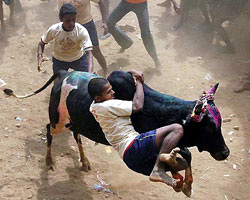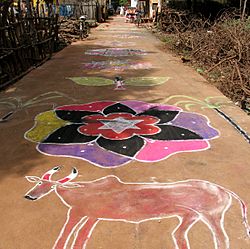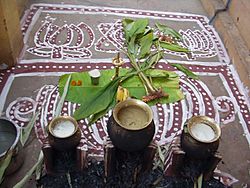Mattu Pongal facts for kids
Quick facts for kids Mattu Pongalமாட்டுப் பொங்கல் |
|
|---|---|
| Observed by | Tamil people |
| Type | Tamil festival |
| Significance | Thanksgiving for cattle and farming livestock |
| Celebrations | Feasting |
| Date | Second day of the month of Thai in the Tamil calendar |
Mattu Pongal (Tamil: மாட்டுப் பொங்கல்/பட்டிப் பொங்கல்) is the third day of the four-day Pongal festival. It is usually celebrated on January 16th each year. While it's mainly known in Tamil Nadu, people also celebrate it in other southern Indian states like Andhra Pradesh and Karnataka.
The word "Mattu" in Tamil means bull. This special day of Pongal is all about celebrating cattle, especially bulls. Bulls work very hard to help farmers grow crops in their fields. The festival is also celebrated by Tamil people in Sri Lanka.
This festival is a time when everyone, no matter if they are rich or poor, old or young, eats together. It's a friendly gathering where everyone shares food and sweets. It's also a way to share the fresh harvest from the fields with the community, animals, and birds. Mattu Pongal also marks a change in the seasons.
A popular village sport called Jallikattu is a big part of the Mattu Pongal festival. It's held with lots of excitement in the villages of Tamil Nadu. This sport usually takes place in the evening on Mattu Pongal day.
Contents
What is Mattu Pongal?
Mattu Pongal gets its name from two Tamil words. "Mattu" means 'bull', and "Pongal" means 'boiled rice'. It also means good luck and plenty. The Pongal festival celebrates new beginnings and growth. It happens after the rainy season ends and rice crops are ready to be harvested. This festival lasts for three or four days.
An Old Story About Mattu Pongal
There's a story about Mattu Pongal and the god Shiva. Shiva sent his bull, Nandi, to Earth with a message. Nandi was supposed to tell people to take an oil bath every day and eat only once a month. But Nandi got it wrong! He told people to take an oil bath once a month and eat every day.
Shiva was upset with Nandi's mistake. So, he sent Nandi to live on Earth forever. Nandi's job was to help farmers grow more food. This way, people would have enough to eat every day.
How People Celebrate Mattu Pongal
Mattu Pongal is a part of the bigger Pongal festival. Pongal is a four-day celebration that marks the Tamil New Year. It starts on January 14th every year.
- The first day is called Bhogi. On this day, people clean and decorate their homes. They buy new things and burn old, unwanted items. This day honors the god Indra.
- The second day is Pongal, or Perum Pongal. This is the main festival day. People worship the Sun on this day. It's also known as Makara Sankranti in other parts of India.
- The third day is 'Mattu Pongal'. This is when bulls, cows, and other farm animals are honored.
- The fourth day is 'Kannum Pongal'. On this day, people visit older family members and friends to get their blessings. Sometimes, it's also called 'Kanru Pongal', which means Calf Pongal, as calves are fed.
On each day of the festival, people draw beautiful designs called Kolam in front of their houses. They use colored rice powder or chalk powder. On Mattu Pongal day, the Kolam designs often include pictures of cows.
Food and Offerings
During the festival, people worship Parvati, Shiva's wife, and their son Ganesha. They offer them a special rice dish called Pongal. This dish is then offered to the cattle.
The pot used to cook Pongal rice is decorated with fresh turmeric leaves and sugarcane pieces. The ingredients for Pongal include rice, green gram, and milk. People watch closely as the milk boils and overflows. If it overflows on the right side of the pot, it's seen as a very good sign.
Sometimes, people make a small statue of Ganesha from cow-dung. They decorate it with special grasses and flowers. The Pongal food, along with turmeric, ginger, sugarcane, and garlands, is offered to Ganesha.
On Mattu Pongal day, sisters often offer small rice balls to crows and other birds. This is a special prayer for the well-being of their brothers. They say, ‘Kakai Ku Pudi, Kuruvi Ku Pudi’, which means "this rice ball is for the crow, this rice ball is for the sparrow."
Decorating the Cattle
On Mattu Pongal day, cattle are washed and their horns are painted. They are decorated with shiny metal caps, colorful beads, and bells. Farmers tie corn and flower garlands around their necks. They also put turmeric and red powder on the cattle's foreheads.
The cow-keepers, dressed in their best clothes, sprinkle the cattle with saffron water. They use mango leaves and pray to protect the animals from harm. They shout, "பொங்கலோ பொங்கல்!" ("Pongaloo Pongal!"), which is a wish for the cattle to grow and be healthy. This prayer asks for blessings from Indra and Krishna, who was a cowherd.
People show respect to the cows by bowing down, like they do in a temple. They touch the cattle's feet and foreheads. Then, they perform an aarti (showing a flame) and offer them a sweet dish called Sakkar Pongal. This dish is made from rice, green gram, jaggery, and dry fruits.
After this, the cattle are led in a parade through the village streets. Music bands often join in. The sound of their bells fills the air. Young men race their cattle, and the whole village becomes lively and fun.
Jallikattu: The Bull Sport

Jallikattu is a traditional bull sport held during the Mattu Pongal celebrations. It is very popular in southern Tamil Nadu, especially in places like Madurai and Tiruchirapalli.
In this sport, bulls are specially trained. Prizes are offered to the young men who participate and to the bull owners. The event takes place in a special area in the village. Many people gather to watch.
Bulls are led into a ring one by one. Young men try to hold onto the bull by its horn, neck, or tail. If the young men hold on for a certain distance or time, they win prizes. If the bulls manage to throw off the participants, the prizes go to the bull owners. This sport is seen as a brave act for the young men. Unlike some other bull sports, the bull is never harmed or killed.
There were some concerns about the safety of this festival. However, the government has made sure that there are enough safety measures in place. Doctors are ready to help anyone who gets injured. There is also strong fencing between the bull ring and the audience to keep everyone safe.
Similar Festivals Around the World
It's interesting to see how some Hindu festivals, especially in South India, are similar to Christian celebrations in Europe. For example, the winter solstice is when the Sun enters Capricorn. This happens around December 21st in the Christian calendar. In the Hindu Tamil calendar, this event is called Makara Sankranti, which usually falls in mid-January.
Hindus celebrate Makara Sankranti for three days. Mattu Pongal, the feast for cattle, is held the day after the Sun enters Capricorn. This worship of cattle during Mattu Pongal is very similar to a Catholic event in Rome. On January 17th, called Saint Anthony day, cattle like cows, horses, and goats are blessed.
One expert, Wilson, noticed these similarities. He said that if a Hindu priest from South India were to see the Saint Anthony's Day celebration in Rome, he would think they were celebrating Pongal! The timing, the decorating of the cattle, and the blessings for protection are all very much like the Indian festival.



